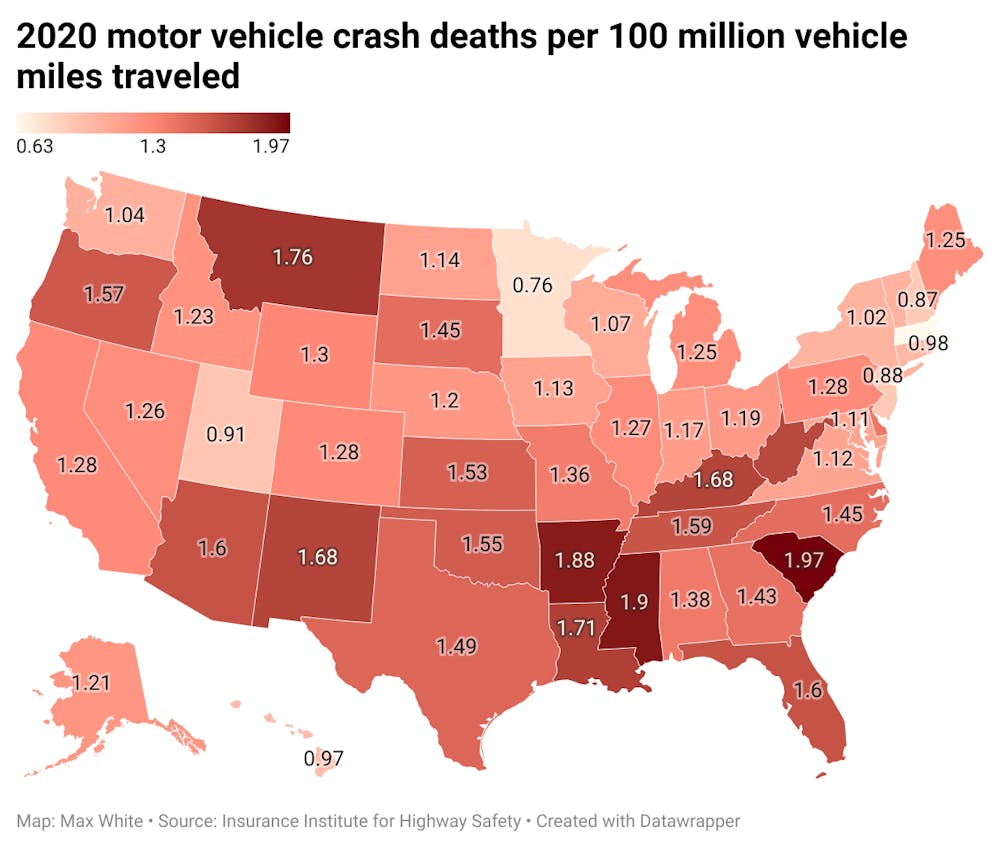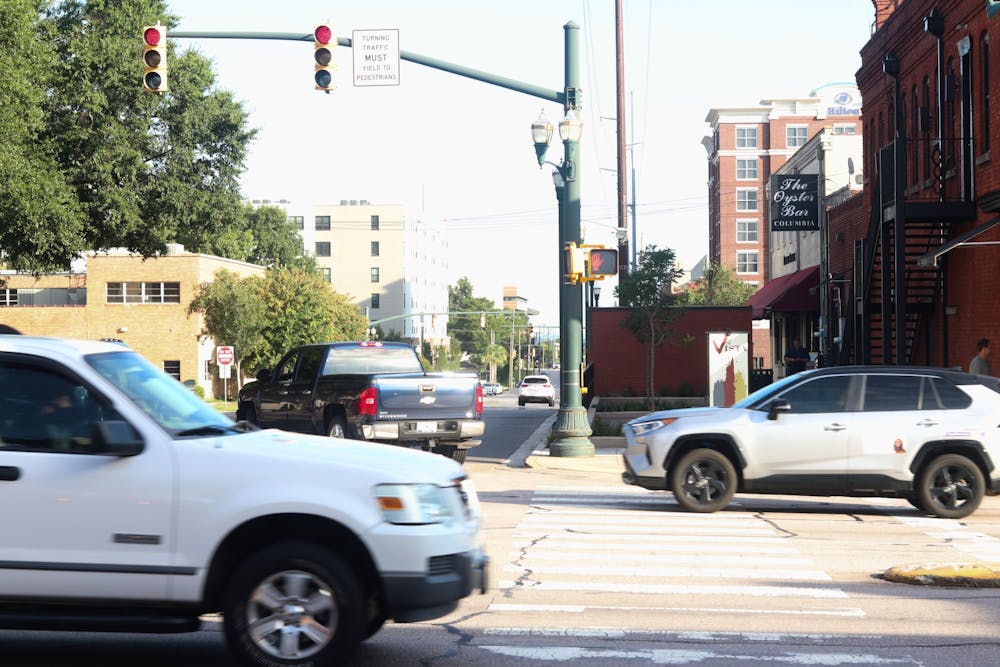South Carolina is one of the most dangerous states for both drivers and pedestrians, making experts wonder how the state's rural geography, history of inadequate infrastructure and poor education contribute to the issue.
The South consistently ranks as one of the most dangerous regions to drive in. South Carolina is no exception. The state had the most deaths per 100 million vehicle miles traveled in 2020.
Robert Hartwig, director of the Risk and Uncertainty Management Center at USC, said this is due in part to the high amount of rural highways in the region.
"When you have more rural highways, you tend to have people speed more and speed is one of the principal causes of death," Hartwig said.
In addition, Duncan Smith, the state traffic safety engineer at the SC Department of Transportation, said the two major constants in motor vehicle crash deaths in the state are speeding and roadway departures.
Rep. Rita Allison (R-Spartanburg), the chairman of the state legislature's House Education and Public Works Committee, said a "little lack of personal responsibility" contributes to the state's high motor vehicle crash deaths.
"We have a lot of speeding in the state, I think we have a lot of drivers in the state that do not obey the laws as far as speed goes," Allison said.
These decisions that drivers make, whether to drive drunk or to drive past the speed limit, wholly belong to the drivers, and Allison said they should be blamed for these poor decisions. Trooper David Jones, an S.C. Highway Patrol Community Relations Officer, echoed this sentiment.
"As troopers and as police officers, we can do everything we can but drivers need to take responsibility and do the smart thing, which is obey the law," Jones said.
Hartwig said South Carolina has a "more hands-off approach towards enforcement" and this contributes to the state's high motor vehicle crash deaths.
"I think South Carolina is a state that, like many states in the South, prefers to take a less heavy-handed approach towards government enforcement and regulation, relative to, say, states like New York or Massachusetts," Hartwig said.

Allison agreed the state is more hands-off with enforcement, as did her colleague on the House Education and Public Works Committee, Rep. Paula Calhoon (R-Lexington). Only after December 2005 could a motorist in South Carolina be pulled over for not wearing a seatbelt and the state also lacks a ban on drivers holding a handheld device while driving.
"We have had hands-free, distracted driving, whatever you want to call it, legislation every year since I've been (in office)," Calhoon said. "There always seems to be a extra step in the process of trying to get those laws passed."
It is also not mandatory for people above the age of 21 to wear a helmet while riding a motorcycle.
"(Motorcycle riders) have a thing about helmets in the state and they want it to be their personal right whether they wear a helmet or not," Allison said. "They've been very much against a helmet-mandatory law in this state."
Jones said he does not agree that enforcement in the state is hands-off. He said most collisions occur on secondary roadways rather than on the interstate, which explains why there might appear to be a lack of speed traps on the interstate.
"You're not going to focus your resources and manpower on an area that isn't deemed a trouble area as far as collisions and poor driving behaviors, you got to send those resources to where they're needed most," Jones said.
Allison and Calhoon said they believe the amount of law enforcement officials in the state is lacking and that it has been a struggle to attract new people into the field.
"(Our) highway patrol or troopers, whatever you want to call them, are significantly down in the number that are on our roads at this time," Calhoon said.
The lawmakers said they hoped recent raises in pay for law enforcement would attract more people to the field.
"We've got to continue to respect law enforcement and in this state and all other states," Allison said. "The pay scale needs to be continued to look at so that we give them the compensation that they deserve."
An inadequate infrastructure to fit South Carolina's growing population was also a common explanation given for the state's dangerous driving environment. However, Smith said traffic congestion and safety do not always go hand-in-hand as a more congested road might lead to less speeding.
"The state of South Carolina was sort of behind the eight ball when it came to paving and potholes and all of that," Allison said.
Allison said the state's gas tax, which was raised in July, has helped fund infrastructure maintenance. Although, there were talks of suspending the tax to alleviate recent high gas prices.
Even with more money being allocated to infrastructure, Hartwig said it takes a long time for infrastructure spending to come to fruition.
To make the state safer, the Department of Transportation has established the Strategic Highway Safety Plan as well as the Rural Roads Safety Program. Smith said some of the main focuses of both of these programs is to prevent roadway departures and to mitigate the damage caused by them.
Smith said these goals are achieved with rumble strips, brighter and wider pavement markings and paved shoulders as well as clearing out trees and other obstacles on the side of the road.
"Our approach is number one is to keep them on the road, number two if they leave the road, provide them with a safe area of recovery," Smith said.
Another area many said the state could improve in is educating drivers on safety and good driving habits.
"We need to do a better job of educating our motorists and our vulnerable road users," Smith said.
However, Jones disagreed with Smith and said the state has a "great education initiative."
There is no single answer to why South Carolina has so many motor vehicle crash deaths. Rural highways attribute to the danger, however, neighboring states such as Georgia and North Carolina that have similar environments are not nearly as deadly.
South Carolina is also around the national average with seatbelt use rate, and the state ranks highly in speeding tickets given out per year.
Close to a thousand people die in motor vehicle crashes every year in South Carolina. Yet, it is not often a hot topic among lawmakers.
Hartwig said there is a view that safer motor vehicle technology will eventually solve traffic deaths.
"Many transportation officials might wonder, at least privately, does it make a lot of sense to make huge investments? When maybe 20 years from now everybody will be driving a vehicle that's at least as sophisticated as a Tesla and probably even more so given advances in technology," Hartwig said.
However, even if technology will eventually end motor vehicle crash deaths, Hartwig said that is kicking a problem down the road that kills thousands of South Carolinians every year.
"Hundreds of thousands of people will die between now and the time we have the majority of people driving and driving fully autonomous vehicles," Hartwig said.

